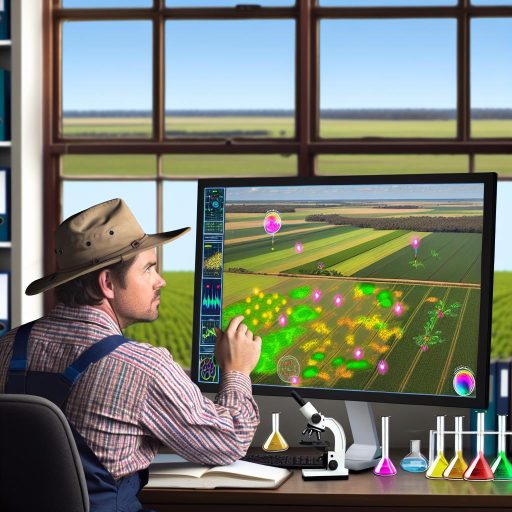Introduction
Agriculture Sector in Australia and Its Significance to the Economy
Australia’s agriculture sector plays a critical role in the nation’s economy.
It contributes significantly to exports, food production, and rural employment.
As the global population grows, the demand for agricultural products continues to rise.
In 2024, this sector is projected to experience growth, with technology and sustainability driving many changes.
How the Demand for Agriculture Jobs has Evolved and is Projected to Change in 2024
The demand for skilled agriculture professionals has evolved in recent years.
Roles that focus on innovation, sustainability, and technology are now more essential than ever.
The shift towards smart farming and climate adaptation has led to increased demand for specific expertise.
Key in-demand agriculture jobs in 2024 include:
- Agronomists: Providing critical advice on crop management and soil health.
- Farm Managers: Overseeing daily operations and ensuring farm efficiency.
- Precision Agriculture Technicians: Utilizing technology for data-driven farming.
- Sustainability Consultants: Implementing environmentally friendly practices.
Purpose of the Blog Post
This blog post highlights these top Aussie agriculture jobs.
Our goal is to help you explore opportunities and navigate the growing industry.
Embrace these roles to stay competitive in Australia’s thriving agricultural landscape.
The Current State of Australian Agriculture
Statistics Related to the Agriculture Sector’s Contribution to the GDP
Australia’s agriculture sector plays a significant role in the nation’s economy, contributing around 2-3% to GDP.
Recent statistics show the industry generating over $70 billion annually.
Key sectors include livestock, grains, and horticulture, each contributing substantially to both domestic and export markets.
The sector employs more than 250,000 people, reinforcing its importance to Australia’s economic landscape.
Your Personalized Career Strategy
Unlock your potential with tailored career consulting. Get clear, actionable steps designed for your success. Start now!
Get StartedKey Trends Affecting the Agriculture Industry
Several trends are reshaping the Australian agricultural landscape.
These include:
- Technology adoption: Farmers increasingly use precision farming tools like drones, sensors, and automation to boost efficiency.
These technologies allow them to better monitor crop health, manage water usage, and optimize harvests. - Climate change: Changing weather patterns challenge crop yields and livestock productivity.
Adaptation strategies, like drought-resistant crops and improved water management systems, are gaining momentum. - Market demand: Growing global populations and rising demand for sustainable, organic products drive changes in production methods and supply chains.
This encourages more environmentally friendly and ethical farming practices.
Regional Variations in Australian Agriculture
Agriculture varies significantly across Australia, with specific regions excelling in different areas:
- New South Wales and Victoria: Known for dairy farming, viticulture, and wool production, these regions are crucial to the livestock and dairy industries.
- Queensland: Tropical climate supports fruit farming, especially bananas, sugarcane, and citrus fruits, driving the state’s export markets.
- Western Australia: Wheat and grain production dominate here, supplying both local and international markets.
- South Australia: Known for wine production and horticulture, it plays a vital role in Australia’s agricultural exports.
In 2024, Australian agriculture will continue evolving.
Advances in technology, climate adaptation strategies, and growing global demand will shape the sector’s future success.
Emerging Technologies in Agriculture
Industries are rapidly evolving, and agriculture is no exception.
New technologies are revolutionizing farming practices.
These advancements are shaping the future of agriculture.
They are also influencing the types of jobs available.
The transformation brought by these technologies creates both opportunities and challenges for the workforce.
Overview of New Technologies Transforming Agriculture
Several emerging technologies are proving crucial to modern agriculture.
These include:
- Drones: Drones play a significant role in monitoring crops and livestock.
They provide real-time aerial images. This helps farmers assess the health of their fields efficiently. - Artificial Intelligence (AI): AI tools analyze large amounts of data.
They help predict weather patterns and optimize planting schedules. - Internet of Things (IoT): IoT devices connect machinery and monitors.
They gather data from various sources for better decision-making. - Robotics: Robotics increases precision in planting, harvesting, and packing.
Automated systems reduce labor costs and increase efficiency. - Biotechnology: Advances in genetic engineering enhance crop yields.
They create resilient plants that withstand harsh environmental conditions.
These technologies are changing the landscape of agriculture.
Farmers adopt them to increase productivity and sustainability.
As a result, their methods are evolving at a rapid pace.
Impact of Technologies on Job Roles and Skill Requirements
The introduction of these technologies significantly impacts job roles within agriculture.
Traditional farming jobs are changing.
Workers now require a new set of skills to adapt to this technological shift.
- Data Analysis: Workers increasingly need skills in data analysis.
Understanding data helps optimize farm operations. - Technical Proficiency: Familiarity with new equipment is vital.
Employees must know how to operate drones, automated machinery, and IoT devices. - Problem-Solving Skills: Workers must address technical challenges promptly.
A strong ability to troubleshoot technology becomes crucial. - Environmental Awareness: Understanding sustainable practices is essential.
Workers must know how to minimize environmental impacts using new technologies. - Continuous Learning: The fast-changing agricultural landscape necessitates ongoing education.
Workers must adapt to new tools and trends consistently.
These shifting requirements mean that traditional training will evolve.
Educational programs must focus on technology integration.
Future agricultural professionals will need a blend of hands-on experience and technical knowledge.
Examples of Technology-Driven Agricultural Practices
Technology-driven practices lead to innovation and increased job creation.
Here are a few examples showing how this shift occurs:
- Precision Agriculture: This approach uses GPS and IoT devices.
Farmers can monitor soil moisture levels and crop health accurately.
As a result, specialists in precision agriculture are in high demand. - Automated Irrigation Systems: IoT technology enables smart irrigation.
These systems adjust water supply automatically, reducing waste.
They require technicians skilled in installation and maintenance. - Vertical Farming: Urban farming practices employ robotics and LED technology.
These innovative methods create new jobs in plant management and technology maintenance. - Remote Sensing: Drones equipped with sensors collect crucial data.
This practice requires support roles in data analysis and drone operation. - Livestock Monitoring: Wearable devices track animal health and location.
This technology necessitates training in animal welfare and data interpretation.
These examples showcase the ways technology fosters job creation.
There is an emerging need for skilled workers who understand these innovations.
The agricultural landscape is becoming increasingly digital and data-driven.
Emerging technologies are reshaping the agricultural sector significantly.
Their influence extends to job roles and skills needed to thrive.
As farmers adopt drones, AI, IoT, and other innovations, the demand for a skilled workforce grows.
Workers will need to adapt to the evolving landscape continuously.
As technology permeates agriculture, new opportunities arise.
Farmers can increase yields, reduce costs, and practice sustainability.
The industry now demands skilled, educated workers.
This evolution promises not only efficiency but also a vibrant job market in the coming years.
Stand Out with a Resume That Gets Results
Your career is worth more than a generic template. Let us craft a resume and cover letter that showcase your unique strengths and help you secure that dream job.
Get HiredBasically, technology in agriculture is not merely an enhancement.
It signifies a fundamental shift in how food is produced and managed.
As these advancements continue, the agricultural workforce must evolve alongside them.
The future of agriculture holds great potential, ripe for exploration and achievement.
Read: Australia’s Mining Engineers: Education Pathways
Top In-Demand Job Roles in 2024
The agricultural sector in Australia continues to evolve rapidly.
As we approach 2024, several job roles emerge as highly sought after.
These positions shape the future of farming and food production.
Here, we explore four key agriculture jobs, detailing the essential responsibilities and salary expectations.
Agricultural Scientist
Agricultural scientists play a crucial role in studying and improving agricultural practices.
They focus on developing new crops and enhancing soil health.
These experts conduct experiments to boost crop yield and sustainability.
Key Responsibilities
- Conduct research on soil, crops, and livestock.
- Analyze data to provide insights into agricultural practices.
- Develop innovative solutions for pest control and resources management.
- Collaborate with farmers to implement new technologies.
- Publish findings in scientific journals and industry reports.
Salary Expectations
- Early Career: AUD 65,000 – AUD 80,000 per year.
- Mid-Level: AUD 80,000 – AUD 100,000 per year.
- Senior Positions: AUD 100,000 – AUD 120,000+ per year.
Farm Manager
Farm managers oversee the daily operations of agricultural businesses.
Their leadership ensures production efficiency and profitability.
They manage resources, labor, and farming techniques.
Key Responsibilities
- Plan crop rotation and livestock management strategies.
- Supervise farm staff and provide training.
- Monitor crop health and implement pest control measures.
- Manage financial aspects, including budgets and expenses.
- Coordinate the sale and marketing of produce.
Salary Expectations
- Entry-Level: AUD 60,000 – AUD 70,000 per year.
- Experienced: AUD 70,000 – AUD 90,000 per year.
- High-Level Positions: AUD 90,000 – AUD 120,000+ per year.
Agronomist
Agronomists specialize in crop production and soil management.
They analyze agricultural systems to improve productivity and sustainability.
Their expertise guides farmers in decision-making.
Key Responsibilities
- Research soil and crop conditions to increase yield.
- Provide strategic advice on crop selection and treatments.
- Monitor regulatory changes impacting farming practices.
- Conduct field trials to test new agricultural methods.
- Ensure compliance with environmental regulations.
Salary Expectations
- Graduate Level: AUD 65,000 – AUD 75,000 per year.
- Mid-Career: AUD 75,000 – AUD 90,000 per year.
- Senior Agronomist: AUD 90,000 – AUD 110,000+ per year.
Agricultural Technology Specialist
As technology permeates agriculture, specialists in this field are in high demand.
These professionals focus on integrating advanced technologies into farming practices.
They help farmers optimize operations using data and innovative tools.
Key Responsibilities
- Implement precision agriculture technologies for efficiency.
- Analyze data to advise on crop management practices.
- Train farm staff to use new technological tools.
- Collaborate with tech companies to develop new solutions.
- Monitor the effectiveness of implemented technologies.
Salary Expectations
- Entry-Level: AUD 60,000 – AUD 75,000 per year.
- Experienced: AUD 75,000 – AUD 95,000 per year.
- Senior Specialist: AUD 95,000 – AUD 120,000+ per year.
Therefore, these in-demand agriculture roles for 2024 reflect the sector’s growth and technological advancement.
Agricultural scientists, farm managers, agronomists, and agricultural technology specialists represent diverse opportunities within the industry.
With competitive salaries and dynamic work environments, these roles promise a fruitful career in Australia’s agricultural landscape.
Aspiring professionals should consider these paths to contribute meaningfully to sustainable farming practices and innovation.
Read: Agricultural Mining Engineering: Aussie Insights

Skills and Qualifications Needed
The agriculture sector in Australia offers diverse and evolving roles.
Here’s an overview of the essential skills and qualifications needed to thrive in this industry.
Essential Skills for Various Roles
Technical Skills
- Proficiency in operating and maintaining farm machinery.
- Understanding of sustainable farming practices and environmental regulations.
- Knowledge of crop management, animal husbandry, or soil science.
- Experience with data analytics and precision agriculture technologies.
Management Skills
- Ability to manage teams, resources, and farm operations efficiently.
- Strong problem-solving and decision-making skills in high-pressure environments.
- Proficiency in budgeting, financial management, and resource allocation.
Interpersonal Skills
- Strong communication skills for collaborating with suppliers, clients, and teams.
- Negotiation skills when dealing with contracts and partnerships.
Relevant Qualifications
Agriculture Degrees
- A bachelor’s degree in Agriculture, Agronomy, Animal Science, or Horticulture is often essential.
Certifications and Training Programs
- Certification in precision agriculture or livestock handling can provide a competitive edge.
- Vocational training programs in machinery operation and farm management are highly valued.
Apprenticeships and On-the-Job Training
- Many roles require practical experience through apprenticeships or internships in farming practices.
Importance of Continuing Education
Agriculture continues to evolve with advancements in technology and sustainability.
Lifelong learning plays a critical role in staying relevant in this industry.
- Staying Updated on New Technologies: Regular training in precision farming and ag-tech tools keeps professionals at the forefront of innovation.
- Adapting to Market Demands: Ongoing education helps individuals respond to new market trends and regulatory changes.
- Boosting Employability: Continuous learning ensures a competitive edge and opens doors to leadership roles.
By cultivating the right skills and maintaining relevant qualifications, professionals can excel in Australia’s agriculture sector in 2024.
Transform Your LinkedIn for Maximum Impact
Elevate your professional brand with a LinkedIn profile that attracts recruiters, showcases your expertise, and maximizes opportunities. Stand out in your industry with a profile built for success.
Boost ProfileRead: Mining in Australia: Engineers’ Innovative Impact
Regional Job Opportunities
The agricultural sector in Australia presents a wealth of job opportunities across various regions.
Each area possesses unique industries and agricultural practices that cater to the nation’s diverse agricultural landscape.
Understanding the regions with the highest demand for agricultural jobs is essential for job seekers planning their careers.
In this section, we will identify key regions, highlight local agricultural industries, and provide relocation advice for prospective job seekers.
Regions with High Demand for Agriculture Jobs
Several regions in Australia are experiencing significant growth in agricultural job opportunities.
Below is a detailed list of these regions:
Queensland
- Queensland has a dominant agricultural sector, producing sugarcane, fruits, and vegetables.
- The state is also noted for beef cattle farming and horticultural exports.
- Job opportunities are abundant in areas such as Bundaberg, Rockhampton, and Brisbane.
Victoria
- Victoria’s diverse climate supports the production of various crops, including wine, dairy, and grains.
- The region leads Australia in dairy farming, with major areas including Gippsland and Northern Victoria.
- Agricultural services are thriving, creating roles in agronomy and farm management.
New South Wales
- New South Wales is a significant contributor to Australia’s agricultural output, especially in beef, sheep, and cereal crops.
- Key agricultural regions include the Riverina, Central Coast, and Northern New South Wales.
- Job seekers can find opportunities in both commercial farming and agribusiness roles.
South Australia
- South Australia is renowned for its wine production, particularly in the Barossa Valley and McLaren Vale.
- The state also produces grains, legumes, and livestock, especially in the Eyre Peninsula.
- Agricultural technology is on the rise, demanding specialists in innovation and sustainability.
Western Australia
- This region holds immense potential for job seekers, particularly in grains and livestock.
- The Wheatbelt region is vital for wheat production, while the northern areas focus on tropical fruits.
- Job opportunities also abound in agribusiness, agricultural engineering, and resource management.
Local Industries and Agricultural Practices
Understanding local industries and agricultural practices is crucial for prospective job seekers.
Here’s an overview of significant practices in these regions:
Queensland
- Sugarcane farming remains the backbone of Queensland’s agriculture.
- Horticultural production includes tropical fruits like bananas and avocados.
- Cattle ranching forms a vital component of the beef supply chain.
Victoria
- Wine production thrives in regions like the Yarra Valley.
- Dairy farming is extensive, servicing both domestic and export markets.
- Vegetable and fruit farming is prevalent, with focus on sustainability practices.
New South Wales
- Cereal crop farming dominates regions like the Pilliga and Liverpool Plains.
- Fruit growing, particularly orchards for apples and citrus, are common in the valleys.
- Sheep grazing is prominent in the prime pastoral zones.
South Australia
- Wine cultivation is matched with an emphasis on high-quality produce.
- Grain farming is strategically integrated with livestock production.
- Innovative farming practices enhance water conservation and soil management.
Western Australia
- The grains industry leads production, particularly wheat, barley, and canola.
- Tropical horticulture flourishes in the northern regions, producing mangoes and cucumbers.
- Agtech innovations drive advancements in resource efficiency and productivity.
Relocation Advice for Job Seekers
For job seekers considering relocation to these high-demand regions, several factors should guide their decisions.
Here are key pieces of advice:
Research Local Opportunities
- Investigate companies and farms that operate within your field of interest.
- Utilize job boards, local agricultural organizations, and social media platforms.
- Network with professionals in the industry to discover hidden opportunities.
Visit the Region
- Before moving, visit to understand the local culture and lifestyle.
- Engage with local communities and farmers to gain insights into the industry.
- Scout potential housing options based on commute and lifestyle preferences.
Consider Cost of Living
- Research housing costs, transportation expenses, and local amenities.
- Compare salaries in the agricultural sector with the cost of living in the area.
- Evaluate the availability of schools and other essential services for families.
Embrace Local Culture
- Immerse yourself in the local agricultural practices and customs.
- Attend regional fairs and events to connect with the community.
- Build relationships with locals who can provide support during your transition.
In fact, Australia’s agricultural job market favors those willing to explore diverse regions and practices.
By focusing on key regions such as Queensland, Victoria, New South Wales, South Australia, and Western Australia, job seekers can identify opportunities that align with their skills.
Local industries vary greatly, but the demand for skilled professionals remains constant.
Understanding regional practices and embracing relocation advice will position job seekers for success in Australia’s vibrant agricultural sector.
Read: Aussie Mining Engineers: Environment Guardians
Government Initiatives and Industry Support
As Australia’s agricultural sector experiences growth, government initiatives and industry support play vital roles in shaping employment opportunities and training programs.
These initiatives have been designed to meet the needs of a dynamic labor market while fostering sustainable agricultural practices.
Government Programs Supporting Agricultural Employment
The Australian government has implemented several programs that aim to boost agricultural employment and training.
Here’s an overview of some key initiatives:
- National Rural Workforce Strategy: This strategy focuses on addressing labor shortages in rural areas.
It promotes skilled migration and enhances local workforce capabilities. - AgriDigital: This program digitizes supply chains and creates tech-related jobs in agriculture. It offers training to help workers adapt to new technologies.
- Rural Skills Program: Funded by the government, this program provides training in various agricultural fields.
Participants gain essential skills to succeed in the industry. - Farm Hub: This online platform connects job seekers with farming opportunities.
It is a vital resource for job placements across Australia.
These government programs work together to create a robust framework for agricultural employment.
They not only enhance job opportunities but also ensure that workers are well-trained.
Furthermore, these initiatives promote rural development and economic stability.
Industry Organizations and Resources
Several industry organizations offer essential resources for job seekers in agriculture.
These organizations primarily focus on recruitment, networking, and professional development.
Here are some notable examples:
- Australian Farm Institute: This organization conducts research focused on agricultural policy and workforce issues.
It provides insights that help improve employment practices. - Farmers Federation: This federation represents farmers across Australia.
It offers networking opportunities, workshops, and job boards to connect farmers with prospective employees. - Future Farmers Network: This organization targets young agricultural professionals.
It fosters networking and mentorship opportunities to develop the next generation of leaders. - AgCareerStart: AgCareerStart is a platform designed to guide job seekers in agriculture.
It offers resources, career advice, and access to job listings tailored to the sector.
Industry organizations help bridge the gap between job seekers and employers.
They provide essential information on job openings, recruitment events, and professional development opportunities.
Additionally, these organizations advocate for better working conditions and fair wages in agriculture.
Scholarship Opportunities and Funding for Agricultural Studies
Investing in education is crucial for the growth of the agricultural sector.
Scholarships and funding programs play an integral role in encouraging students to pursue agricultural studies.
Below are some key funding opportunities available for aspiring agriculture professionals:
- Young Farmers Scholarship: This scholarship supports young Australians who are passionate about agriculture. It covers tuition costs for agricultural-related degrees.
- AgriFutures Australia: This organization provides funding and grants for research and training.
They also offer scholarships to students in agricultural programs. - State-based Scholarships: Various Australian states offer scholarships for agriculture students.
These programs aim to support rural communities and enhance local agricultural education. - Industry-specific Awards: Many agricultural organizations offer awards and scholarships for excellence in various fields.
These awards provide both financial support and recognition.
Scholarships encourage students to enter the agricultural workforce with the necessary skills and knowledge.
They also create a more educated workforce that can tackle the industry’s challenges effectively.
Additionally, such funding opportunities help alleviate the financial burden of higher education.
Challenges and Future Directions
Despite the presence of numerous programs and support structures, challenges remain in the agricultural job market.
These challenges require ongoing collaboration between government bodies, industry organizations, and educational institutions.
Some major challenges include:
- Labor Shortages: Many regions face a shortage of skilled labor.
Addressing this issue requires targeted recruitment strategies and training initiatives. - Inadequate Training Programs: Some existing programs do not meet the evolving needs of the agriculture industry.
Continuous improvement and adaption of training curricula are necessary. - Technological Advancements: The rapid advancement of technology necessitates upskilling workers.
Industry needs to prioritize training focused on technology adoption. - Attracting Young Talent: Young people often overlook agriculture as a career option.
Better promotion of employment opportunities is essential to attract youth.
Addressing these challenges demands strategic action from all stakeholders involved.
Collaborations among government agencies, industry leaders, educational institutions, and job seekers can create a more sustainable agricultural job market.
These partnerships promote innovative solutions that meet the changing needs of the agricultural sector.
In short, government initiatives and industry support play a crucial role in shaping Australia’s agricultural employment landscape.
With the right resources, training programs, and scholarship opportunities, the sector can continue to thrive.
As demand for skilled workers grows, so too does the commitment from various stakeholders to create a conducive environment for agricultural careers.
Future generations will significantly benefit from these efforts.
Conclusion
In 2024, Aussie agriculture offers exciting, in-demand roles for professionals.
We discussed various key jobs, including agronomists, farm managers, and agricultural scientists.
These roles ensure food security, innovation, and sustainability in the agriculture sector.
Exploring careers in agriculture can lead to rewarding and impactful experiences.
Working in this field helps improve food production, environmental conservation, and community development.
You can play a crucial role in shaping the future of Australia’s agriculture industry.
If you’re ready to pursue an agricultural career, start by exploring job listings on platforms like:
- Seek
- AgriLabour Australia
- Indeed
You can also attend networking events such as agricultural expos and career fairs.
These events help you meet industry professionals and learn about job opportunities.
For further resources, check out government websites and industry-specific organizations for guidance.
Take action today by exploring these resources, attending events, and connecting with professionals.
The agriculture industry awaits your contribution!




